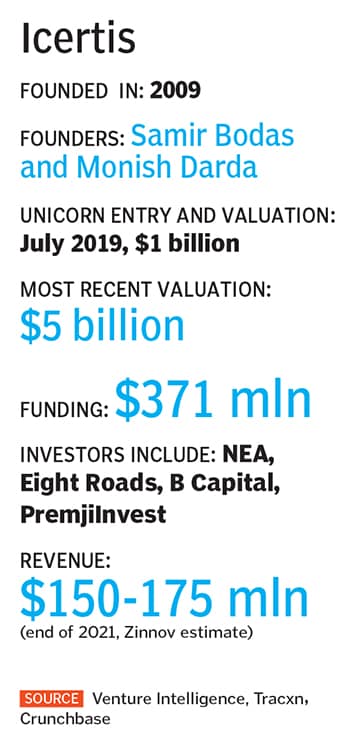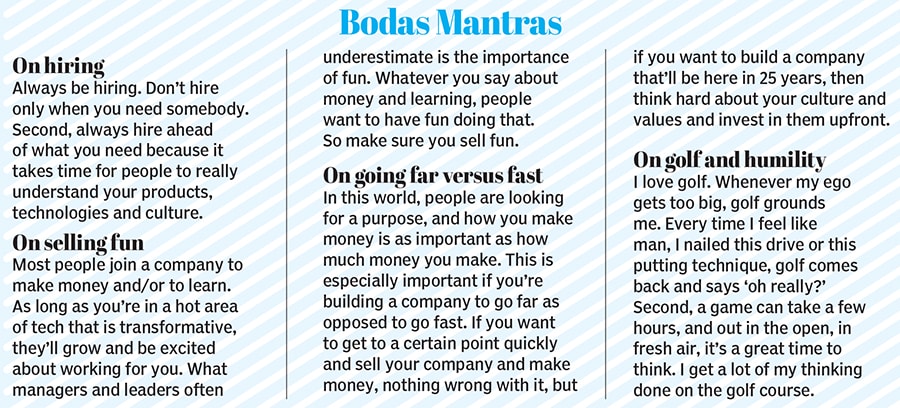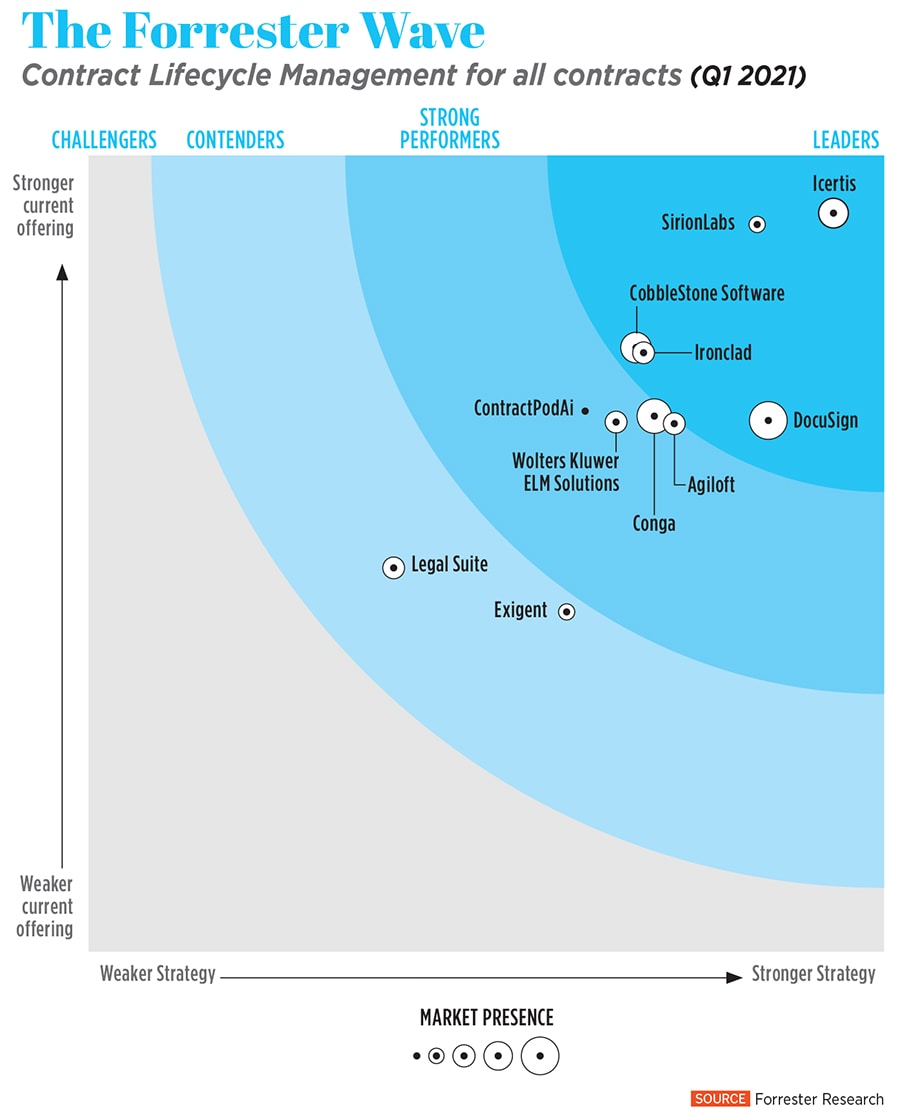Bodas and friend Monish Darda were in their 40s when they founded the company after having built successful careers in both tech startups and larger corporate businesses. They’d known each other and, in fact, at one time, Darda was a customer of Bodas.
Bodas was exiting Aztecsoft, where he had been CEO, and which had been acquired by Mindtree. Darda—who’d previously done six or seven startups—was fresh from BMC Software’s acquisition of Bladelogic, a data centre automation company which he had helped found and where he’d led its India R&D.
Corporate companies get all excited about hiring an entrepreneur, “but then put a leash on you", Bodas likes to say. That sort of made them unemployable in the corporate sector, he jokes. So, in 2009, with too much energy and impatience to be just staying at home for too long, they started Icertis, with some tech consulting to begin with.
At the same time, they were on the lookout for product and tech ideas, from the point of view of riding a large tech wave. The idea was, finding a wave to ride was more likely to work than creating one, which took people like Steve Jobs or Elon Musk.
![]() Serendipity played a big role, Bodas says. Around 2010-11, both Amazon and Microsoft were investing in technologies that eventually became the cloud. Bodas was also based in Seattle, not in Silicon Valley. Both Microsoft and Amazon were in Seattle.
Serendipity played a big role, Bodas says. Around 2010-11, both Amazon and Microsoft were investing in technologies that eventually became the cloud. Bodas was also based in Seattle, not in Silicon Valley. Both Microsoft and Amazon were in Seattle.
A friend in Microsoft told Bodas about how the company was looking for a cloud solution for contract management and they explored it further. There was an RFP (request for proposal). And this was so early in the days of cloud that Microsoft’s cloud platform Azure was yet to get its name and was referred to by its code name, ‘Red Dog’.
The duo built the solution, and Microsoft became their first customer.
Record Year
Ten years on, today, Icertis is emerging as a preferred vendor of contract lifecycle management (CLM) tech for many of the world’s biggest companies. And in the past 12 months, it has grown at record pace.
The pandemic has obviously been “challenging on a personal level or on a human level for everyone, but from a business level, it’s been a great year", Bodas says on a video call from Goa, where the company’s top leadership and board of directors were meeting for the first time since Covid restrictions began to ease around the world.
We grew the company by more than 50 percent. We are now called the leaders in our category, contract lifecycle management, by all the three major analyst firms, Forrester, Gartner and IDC, Bodas says. The company added twice as many customers in 2021 as it did in 2020, and more than half of its customers expanded their business with Icertis during the year.
It also expanded its team by 30 percent, taking it to about 2,000 employees, of whom about 60 percent are in India, 25-30 percent in the US, and the rest in Europe and other markets. “I think we have also established leadership with respect to the type of customers we have and the technology we have, and we are way north of $100 million in revenue," he says.
Bodas declined to give a more specific figure, but consultancy Zinnov estimates the company ended 2021 with revenue in the range of $150 million to $175 million. And with every indication that the company’s growth rate will likely continue this year, Icertis will probably end 2022 with revenue past the $200 million milestone.
While private companies don’t disclose specific revenue or earnings numbers, “Icertis remains cash efficient and very well-funded, given their recent round in January," an industry source familiar with their operations says. “They are focused on best-in-category growth, they use their cash smartly and they are focused on the ‘Rule of 40’," the person said.
The ‘Rule of 40’ is one investors increasingly track with SaaS companies—basically the sum of the revenue growth rate and profit margin. So even if a fast-growing company isn’t making money in the pure net profit sense, if its ‘rule of 40’ percentage matches or exceeds 40 percent over a sustained period, investors tend to like its prospects.
Among the customers Icertis added in 2021 are AkzoNobel, EMAG Group, Pacsun, Persistent Systems and Red Bull GmbH, joining many of the world’s most iconic brands using Icertis Contract Intelligence, including Daimler, Microsoft, Porsche and Sanofi.
Icertis’s solution “has been a critical enabler to our Contracting Centre of Excellence", Sandrine Fleischman, global head of Contracting Centre of Excellence, Sanofi, said in a statement in March. “It has improved performance and decreased cycle times on various contract categories."
Icertis provides a single tool and a streamlined process to facilitate contract management, and improves monitoring and standardisation across contracting operations. “We are now building on this success by rolling out Icertis AI (artificial intelligence) technology to maximise the value of our contract data," she added.
![]()
New System of Record
“CLM is emerging as the fifth system of record, unleashing a new pool of highly valuable enterprise data," Darda, who is the company’s CTO, said in March, when Icertis released an AI Studio for its customers to build some applications on Icertis’s platform by themselves, in a low-code, self-serve manner.
There is demand for new AI tools that ensure the intent of every contract is fully realised, and Icertis’s AI Studio puts this ability in the hands of users, not just data scientists, Darda says.
“Using Icertis Contract Intelligence and its AI technology, Cognizant has been able to rapidly digitise thousands of sell-side contracts, helping our account operations, contracting, and finance teams to work more effectively," Frank Marty, global head for contract lifecycle risk management at Cognizant Technology Solutions, one of the world’s biggest IT services companies, said in a press release at the time.
Icertis’s contract intelligence platform made Cognizant’s contract management with its own customers more efficient, and “added new insights and capabilities that directly improved client service delivery", Marty said. A centralised AI-enhanced contract data repository gives Cognizant’s executives a 360-degree view of contracts enterprise-wide.
Marty’s team can now provide the company’s top leadership with reports on contract risk profile, contractual obligation compliance and other insights that help them run and protect the business, he added.
![]()
With product initiatives like the AI Studio, and through partnerships like the one with SAP that it recently expanded, Icertis is putting itself at the forefront of two important emerging trends—enabling the so-called ‘citizen coders’ by giving the end-business users the tools to build their own apps with little or no help from the traditional IT department, and second, the emergence of industry-specific tailor-made, ‘vertical SaaS (software as a service)’ solutions built on the foundation of deep domain knowledge.
For example, in March, Icertis released a health care-industry-specific solution built on its platform. Other vertical solutions Icertis has released include ones for consumer goods and distribution, medical technology, consulting and IT services, and technology.
Overall, today, Icertis’s contract intelligence platform hosts more than 10 million contracts worth more than $1 trillion, in over 40 languages and in more than 93 countries, according to the company.
Must-have Solution
In order to understand why Icertis’s software is critical to its customers today, think about it this way: “Every dollar that goes into a company, any company, and goes out of it is governed by a contract. It’s the foundation of all commerce," Bodas says.
Contract management is the technology that helps businesses create and negotiate contracts, execute and store them, and perhaps most importantly, in real time, make sure that whatever is memorialised in the contract actually happens in the real world.
![]()
For example, was a component delivered on time, was it of the right quality, was there a discount attached, did the receiver pay on time, and so on—contracts govern everything.
Multiple factors and technologies have converged to make contract management a large opportunity. First, the cloud model and the SaaS model made it possible to deliver Icertis’s solutions to the world, with only relatively small incremental investments, once a product was developed and ready.
Second, natural language processing (NLP) became sophisticated. Contracts are all about the language, and today computers are able to apply NLP to high degrees of accuracy and sophistication. And third, with machine learning (ML), computers ‘learn’ what the meaning of the language in a contract is. And AI sits on top of this, and makes sense of what the computer has learnt.
Finally, blockchains are emerging as a vital tool to ensure that a given contract is the real deal. Meaning that blockchains allow all the parties involved to know they’re all on the same page, that they are all looking at the same set of terms and so on.
And as everything gets digitalised, contract management tech has moved from being a good-to-have discretionary solution to a must-have strategic tool, Bodas says.
$100 million and beyond
At Icertis, here’s how they made it happen. Microsoft became Icertis’s customer about two or three years after Bodas and Darda started the company. After that, the zero-to-$1 million annual recurring revenue journey took another two or three years (by around 2014-15). That was, perhaps, the biggest struggle, involving developing the product, figuring out what was important to customers, getting the product-market fit, and so on.
Getting to $10 million was a bit easier, and it was about figuring out repeatability of sales, and Icertis got there by around 2017. The more successful companies do that quickly and achieve a “triple triple", Bodas says, meaning a 9x revenue growth in two years—roughly what Icertis did.
All this didn’t happen smoothly. There were times when the entrepreneurs considered a couple of other product options to see if they should be changing tack, or ‘pivoting’. But some long walks and discussions with his former hiring manager at Microsoft helped Bodas stay the course, he recalls.
![]()
The jump to the $100 million annual revenue mark is about scale—delivering to a large number of customers around the world. “We got there in three years", by around mid-2020, he had told Forbes India in June 2021.
Over the last three years, Icertis has gone from becoming a unicorn first to more recently being valued at over $5 billion. This was in September 2021 when SoftBank Group bought shares in Icertis from existing investor Eight Roads in a secondary transaction, The Economic Times reported, citing Bodas. SAP has also purchased an undisclosed equity stake in Icertis, The Economic Times reported in January.
At the same time, Icertis and SAP announced they had expanded their ongoing partnership. “This is a very strategic partnership," Bodas says. “It means we will be the preferred contract management partner for all of their products." This includes SAP’s procure-to-pay products like Ariba, SAP HANA, SuccessFactors, their HR product, and so on.
Icertis also has strategic partnerships with Salesforce, Accenture, Deloitte, PwC and several other businesses that help expand the reach of its technologies.
The company has reached a point where the vision is that over the next decade, “there will be a network of contracting platforms around the world" built with one of the company’s contract intelligence technologies. And these systems will be able to negotiate with each other pretty much on their own, given what the counter parties have configured them to be, Bodas says. “And the contracts would be executed in the blockchains."
This will happen first for everyday commoditised transactions and move into more complex contracts where the automated systems will isolate only the parts that need human intervention, so that people won’t need to negotiate the entire contract, ever, he says.
![]()
At the next level, the contracting systems will look at what is written in a contract, connect back with the data from the systems that deliver the actual products and services that are being negotiated over, and make sure that what’s happening in the real world is actually what the intent of the contract is.
“That’s where this technology is going," says Bodas. And Icertis is sitting in the driver’s seat.
***
‘Hub, Club and Remote’ Workplace Mode
In 2021, Icertis grew its staff by 30 percent. The company has also formally instituted a hybrid workplace, giving employees three options from which to choose.
The unicorn status and incrementally higher valuations are gratifying, but they are just another day to savour, and we quickly get back to the real task of building a company that delivers value, Bodas says.
“Do you want to build a company that goes far or that goes fast?" is one of his favourite questions. At the Goa get-together, the idea was part business and part “getting to know each other as humans", says Bodas, who projects genuine empathy for everyone’s quest for purpose in their work and life. That plays a central role in how Icertis functions.
Building Icertis to where it is today has given Bodas much insight into both businesses and people. “Culture and values are so much more important than you ever thought," he says. “Even in the startup world, while it’s more talked about in the corporate world. People are looking for purpose, and how a company makes money becomes really important if you’re building a company to go far as opposed to going fast."
On the corporate side, aligning the whole company along one strategy is super important, he says. In other words, a strategy can be arrived at, but execution—implementing that strategy successfully—holds the key.
And today, the biggest strategic challenge in technology is really talent. Attracting the right people and keeping them motivated and retaining them is “one of the hardest things" given the dearth of talent and boom in demand.
In the post-Covid world, Icertis has decided upon a hybrid workplace that comprises three options, which the company calls the ‘hub, club and remote’ model.
The hub is where the staff will spend 90 percent of their work time in office. The club option is where an employee will spend 50 percent of the time at work in office and 50 percent wherever they want, and the remote option means that they will work from home or from where they can 90 percent of the time, and time spent in office will be only 10 percent.
The company is still collecting data, but initial results are that about 50 percent of the staff have chosen to be remote and 30 percent have chosen club while 20 percent have chosen the traditional office option.
Therefore, “people want that freedom to work from wherever they can, as long as they deliver on their commitments, and participate in the company from a cultural, social and team point of view", he says.

 Serendipity played a big role, Bodas says. Around 2010-11, both Amazon and Microsoft were investing in technologies that eventually became the cloud. Bodas was also based in Seattle, not in Silicon Valley. Both Microsoft and
Serendipity played a big role, Bodas says. Around 2010-11, both Amazon and Microsoft were investing in technologies that eventually became the cloud. Bodas was also based in Seattle, not in Silicon Valley. Both Microsoft and 



